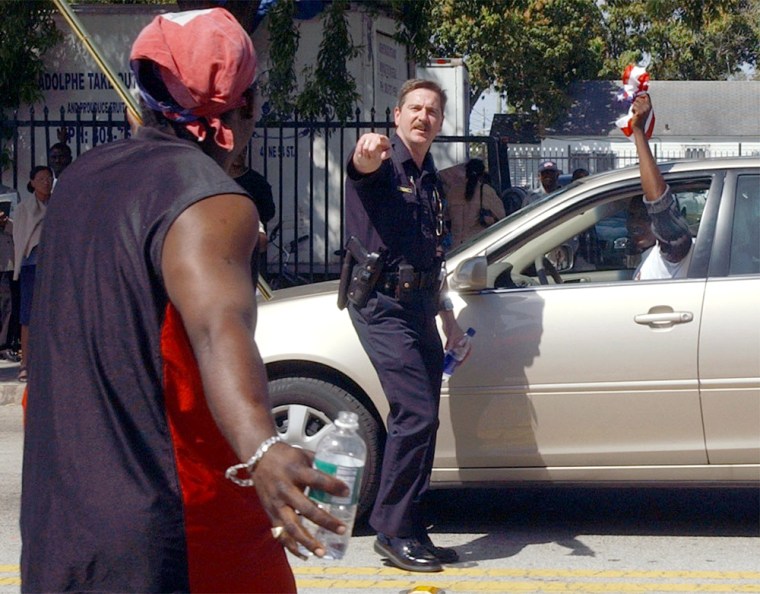In the immigrant neighborhood known as "Little Haiti," with its colorful storefronts, fruit markets, and Creole radio broadcasts, the news of Haitian President Jean-Bertrand Aristide's flight from power spread quickly — sparking an emotional and divergent range of responses.
Inside Notre Dame d'Haiti, the Catholic Church that has long served Miami's burgeoning Haitian community, the mood was reflective and somber.
As parishioners knelt in prayer Sunday, a priest intoned, "This is the moment where we are called to search deep within our souls and see what we can do, and help Haiti become what the Lord is calling it to be."
But, outside the church, the reserve gave way to emotional outbursts and passionate arguments, as many parishioners blamed the U.S. government for forcing Aristide from power.
One man claimed, "The White House, State Department, kidnapped Aristide, OK? It's just plain simple. Haitian people are not stupid." Another shouted, "Enough, enough, enough."
The abduction charge was repeated by an Aristide attorney, although the White House rejected the charge Monday as "complete nonsense." Spokesman Scott McClellan did, however, question Aristide's "fitness" further to run the country.
Mixed views
Yva Jean, who is concerned for the safety of her relatives in Haiti, said simply, "This is not fair." The situation in Haiti, she added, "is very bad now. No president, no nothing."
A few blocks south, in the heart of the Little Haiti business district, a group gathered outside the Pax Villa funeral home to debate the recent developments in Port-au-Prince, the Haitian capital.
Fred St. Amand, Sr., the funeral home owner, argued it was good that Aristide had fled the country, and said, "We should put Haiti first. We should see the interest of the country, not Aristide." When challenged by another man who scoffed at the notion Haiti will get better now, Amand replied, "At least there is hope."
Less than a block away, on the same side of Northeast 54th Street, a crowd of Aristide supporters demonstrated loudly, chanting, "Aristide yes, coup d'etat no."
Some carried pictures of the deposed Haitian president, and at times spilled into the streets where City of Miami police officers stood watch and directed traffic.
Shouting into a megaphone, Haitian-immigrant radio host Ludner Beauvoir repeatedly asked the crowd, "Are you ready to defend Haiti?" The response was always an enthusiastic, "Yes."
The biggest victim in Haiti, Beauvoir argued, is democratic government. "Democracy is dead in Haiti," he said. "It will take 20 years to get it back."
Immigration concerns
Of the some 600,000 Haitians living in the United States, half are in South Florida. Always looming over this community is the threat of deportation, and concerns over the safety of Haitian boat people repatriated by U.S. officials.
In recent days, the U.S. Coast Guard has returned 881 Haitian migrants, most of them plucked from often dangerously overloaded wooden sailboats in the Windward Pass, north of Haiti.
The flow of Haitian boat people, however, appears to be dwindling, at least temporarily. "We are seeing a significant slowdown in the number of migrants in the last couple of days," said Lt. Tony Russell, Coast Guard spokesman in Miami.
Of the Haitians already repatriated, he said, "Those numbers are by no means indicative of a mass migration."
Russell warned the slowdown could be due to weather or other factors and said the United States continues to keep a large presence of cutters and planes in the area.
The Department of Homeland Security announced it has activated a security task force to oversee and coordinate increased activity in the Windward Pass, north of the Haitian coastline.
Angry response
Haitian community activists are angry over the repatriations, claiming they put the migrants returned to Haiti in grave danger, because of the recent violence.
"That's unconscionable given the current political situation in Haiti. No Haitian should be repatriated at this time," said Cheryl Little, the executive director of the Florida Immigrant Advocacy Center.
Little and other Haitian supporters also argued the U.S. government should give temporary protected status to all Haitian migrants, and to those already in the United States seeking political asylum.
A spokesman for the Department of Homeland Security said the United States was not considering granting temporary protected status for Haitians at this time, primarily because of the "short term" nature of the civil strife.
U.S. and Florida officials have long expressed concerns about sparking another refugee exodus, fearing the impact that would have in South Florida, which has already borne the brunt of four mass migrations of Haitians and Cubans since 1980.
Watching helplessly
As the crowds continued their demonstrations in Little Haiti following the departure of Aristide, community leaders pleaded for peace in Haiti.
Marleine Bastien, the widely respected leader of Haitian Women of Miami, said after appearing on a television talk show, "I'm sending a message to my compatriots in Haiti to remain calm and to protect basic human rights there."
As many in Little Haiti watched helplessly the events unfolding dramatically in their homeland, there appeared to be widespread support for an international peacekeeping force.
U.S. Rep. Kendrick Meek, a Florida Democrat, said it is "the only way things will get better."
